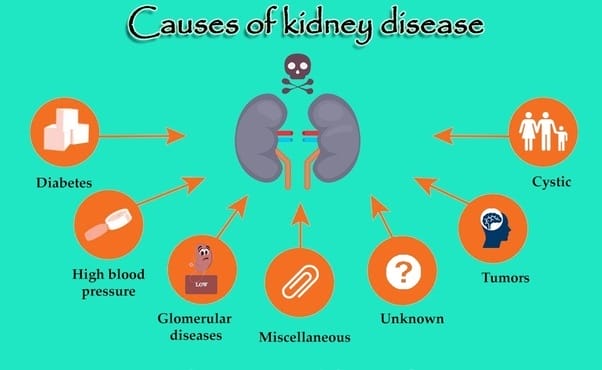Kidneys have various functions apart from the removal of wastes from the body. It maintains the homeostatic balance of body fluids. Kidney Failure or Renal Failure (RF) is a syndrome characterised by a progressive & irreversible decline of renal function. There is a slow destruction of renal parenchyma, and a progressive decrease in the Glomerular Filtration Rate (GFR) eventually may terminate to death. Kidney Failure is further categorised as Chronic and Acute Kidney Failure.
The degradation happens gradually over weeks, months, or years in chronic renal failure, while in the case of acute kidney failure, the damage is quick and sudden. In chronic kidney failures, the kidneys stop working slowly, leading to end-stage renal disease (ESRD).
As per Ayurveda, one can effectively manage Kidney Failures with proper assessment of the dosha, dushya and vyadhi avastha and the treatment modalities mentioned in Ayurveda. Ayurvedic Treatment For Acute Kidney Failure cures disease-causing factors and aims to rejuvenate the body. It also works for the complete revitalisation of the body along with the elimination of the ill effects of all previous disorders.

Causes of acute kidney injury
Most cases of AKI are due to reduced blood flow, direct damage to the kidneys, or blockages in the urinary tract. It also occurs in someone already ill with another health condition. AKI can also be caused by glomerulonephritis.
Decreased blood flow
Some conditions slow down the blood flow to your kidneys and cause AKI. These diseases and conditions include
- Blood or fluid loss (such as bleeding, Vomiting, or Severe Diarrhea)
- Certain Allergic reactions
- Chronic Heart diseases or other conditions leading to decreased heart function
- Injury
- Low blood pressure (Hypotension) or shock
- Major surgery
- Organ failure (heart or liver)
- Overuse of pain medicines called “NSAIDs.”
- Direct Damage to the Kidneys
Some diseases and conditions can damage your kidneys and lead to AKI. Some examples include:
- Cancer, known as “multiple myeloma.”
- Sepsis, a life-threatening infection
- A rare condition called “vasculitis”, where the inflammation and scarring to the blood vessels make them stiff, weak, and narrow.
- Interstitial nephritis
- Scleroderma, affecting the connective tissue

Blockage of the urinary tract
Conditions or diseases that block the passage of urine outflow can lead to AKI. Blockage can be due to the following:
- Bladder, prostate, or cervical cancer
- Blood clots in the urinary tract
- Enlarged prostate
- Kidney stones
- Problems in the nervous system that affect the bladder and urination process.
What tests can find acute kidney injury?
AKI must be assessed as soon as possible. Depending on the cause of the acute kidney injury, your physician will suggest different tests.
The following tests are done for assessment:
- Measuring urine output
- Urine tests
- Blood tests for Creatinine, Urea, Nitrogen, Phosphorus and Potassium levels
- GFR (Glomerular Filtration Rate)
- Imaging tests: like USGs (Ultrasounds), MRIs etc.
- Kidney biopsy
Complications associated with acute kidney injury
The most severe complications associated with acute kidney injury are:
- High potassium in the blood can lead to muscle weakness, paralysis, and heart problems
- Pulmonary oedema (fluid in the lungs)
- Metabolic acidosis, causing nausea, vomiting, drowsiness, and breathlessness

What is Acute kidney disease treatment in Ayurveda?
Kidney Failure is assessed by blood and urine tests. Other tests like a CT scan or MRI can confirm it. Due to decreased capability of the kidneys to excrete waste, higher levels of creatinine is indicated in the blood. Understanding the condition’s causes is the cornerstone of all successful Ayurvedic kidney treatments. Agni is altered in patients with kidney failure, which is found low in patients with kidney diseases. Due to this, there is a disruption in the production of essential components, dosha and dhatu dushti. Lifestyle changes, the consumption of unsuitable foods, alcohol use, tobacco use, and stress all have a significant role in disturbed Agni. The modern system of treatment costs high to patients. Thus arise the need to use affordable medical care with no side effects. Our traditional medical method, Ayurveda, contains durable corrective measures. According to Ayurveda, determining the Dosha, Dushya, and Adhishthana and the severity of the illness and the patient’s capacities is the cornerstone of treating a condition. Following accurate identification, ayurvedic treatment comprises the necessary therapeutic approaches. Kidney Failure as a disorder is not well understood in Ayurveda, but treatment is planned based on the pathophysiology.
Acute kidney failure treatment in Ayurveda is not organ-based. It takes into account many factors like tridosha, saptadhatu and agni vichara.
Various medicines are prescribed in classical texts of Ayurveda for these diseases. As per Ayurveda, Vata dosha, the prime causative factor collaborating with Pitta and Kapha, is responsible for all urine disorders. Ayurveda prescribes tailor-made treatment plans considering all doshas and the patient’s condition. There is also a pre-posed line of treatment for managing Kidney Failures. These treatments are further adjusted as per the patient’s state and include virechana, swedana, mutrapravartaka, raktaprasadaka, agni deepen and sarva dhathu poshaka. Acute kidney disease Ayurvedic herbs includes Regenerative medicines under Rasayana Chikitsa, which helps regenerate nephrons.
Herbs like ‘Punarnava’, ‘Gokhuru’, and ‘Varuna’ are life saviours for patients with acute kidney failure treatment in ayurveda.

